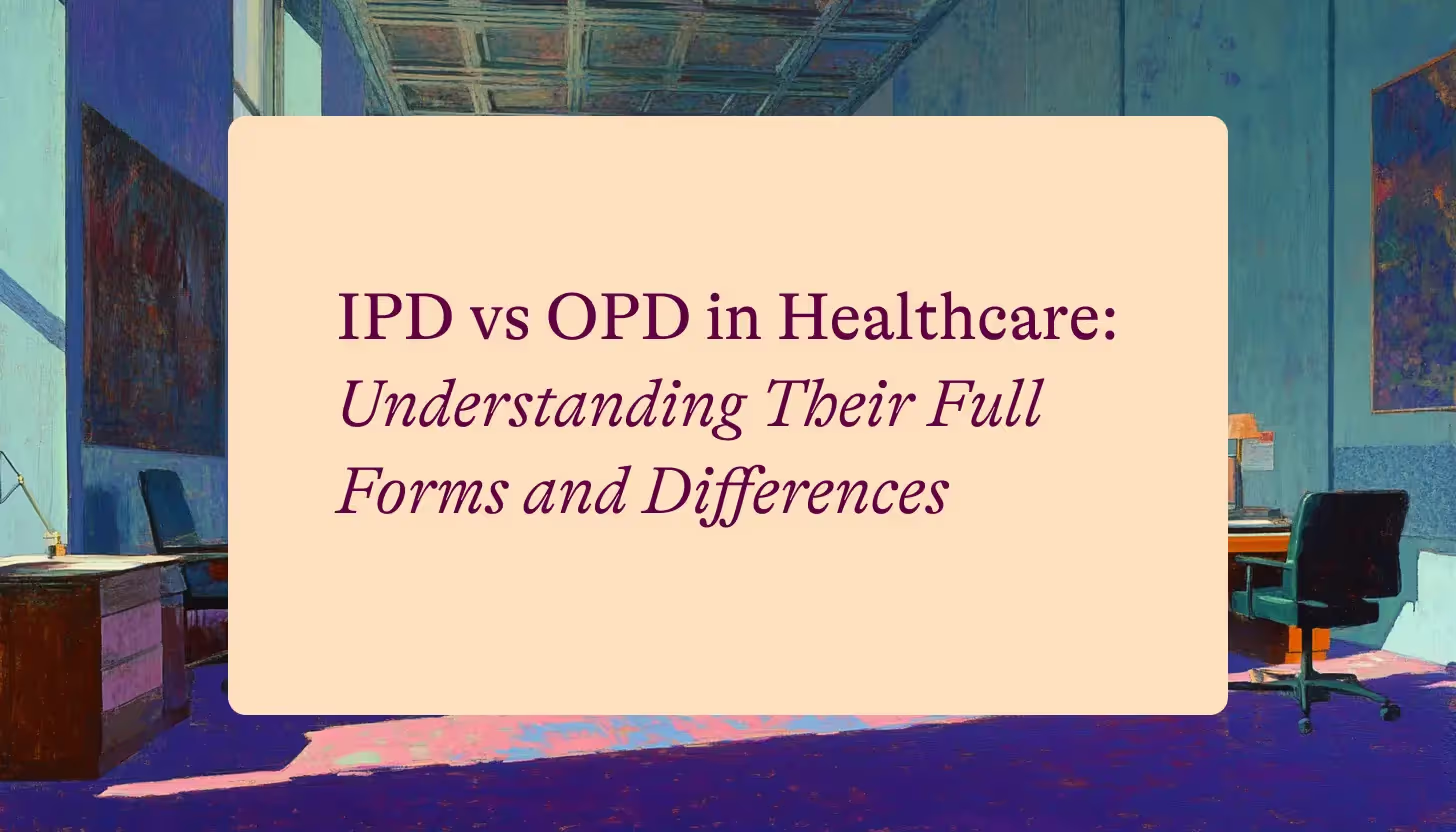In healthcare, you’ll often hear the terms OPD and IPD when talking about treatments, hospital visits, or insurance claims. Understanding the difference between these two is vital—especially when choosing a health insurance policy.
- OPD full form is Outpatient Department and it covers consultations, minor procedures, and treatments where no hospital admission is required.
- IPD full form is Inpatient Department and it covers cases that require hospitalization for more than 24 hours, usually for serious conditions.
Further, the Inpatient Department can also have Day Cover for procedures that require you to be admitted to the hospital, but not necessarily overnight.
What is OPD or Out-Patient Department
“OPD” refers to when you visit a doctor, get a test done, or have a minor procedure — but you don’t stay overnight in hospital.
Examples include:
- A specialist consultation, say for a thyroid check or knee-pain follow-up
- Diagnostic tests like blood-work, X-rays or scans
- A dental cleaning or eye-check that doesn’t need hospital-admission
- Tele-consults that happen from home or a clinic
OPD is fundamentally about out-patient care: you walk in, you walk out. It tends to cost less than full hospitalisation depending on the care provided. But if your workforce or family has frequent doctor visits (say for chronic conditions or preventive care) then OPD cover becomes a meaningful line-item.
What is IPD or In-Patient Department
“IPD” comes into play when you’re admitted overnight or longer in a hospital. This isn’t a quick doctor’s visit — you’re staying in a room, being monitored, perhaps undergoing surgery, recovering in-house.
Scenarios that typically fall under IPD include:
- A major surgery (e.g., hip replacement, cardiac bypass)
- ICU or high-dependency care after a serious illness
- Extended hospital stay for illness, childbirth or recovery
- Pre- and post-hospitalisation care involving admission
Because of the room charges, nursing care, medicines, diagnostics and recovery — IPD expenses can skyrocket fast. That’s why, in India, health-insurance plans often emphasise IPD cover as the foundational element.
OPD vs IPD: A Comparison
Why this distinction matters (and what it means for your team or family)
When you’re evaluating a health-benefits plan — whether for your employees (which is your daily territory, Asa) or for your loved ones — it’s vital to recognise how OPD and IPD play different roles:
- If your people are visiting specialists frequently, undergoing diagnostics regularly, or you’re emphasising preventive care rather than just crisis cover, OPD benefits can add meaningful value.
- For one major hospital stay, the cost could wipe out many months of savings. A strong IPD cover acts as a financial safety-net for when things go serious.
- Many insurers make IPD standard but treat OPD as an add-on. Being aware of that helps you choose and communicate benefits more smartly — no surprises, no jargon-trap.
How Claims Work: OPD vs IPD
Understanding cover is only half the story — the claims process is where most employees either feel confident or completely lost. And OPD and IPD claims work very differently.
OPD Claims: Simple Treatment, Complex Paperwork
Because OPD visits don’t involve hospital admission, most insurance providers treat OPD more like a reimbursement benefit rather than a cashless service.
Here’s how it typically works:
Why it can get confusing:
- Many plans have sub-limits (e.g. ₹1,500 per consultation or ₹5,000 per year total).
- Some insurers only accept network clinics or e-prescriptions.
IPD Claims: Cashless & Reimbursement Options
The IPD side is more structured — most insurers (including Plum partners) have two ways to process claims:
Pre- and post-hospitalisation expenses (like diagnostic tests before admission or medicines after discharge) are also claimed under IPD — but only when tied to a valid hospitalisation.
So, What’s the Real Difference?
Plum Tip for HR Teams & Employees
- Communicate OPD rules upfront: what counts, what doesn’t, and how to file.
- Encourage employees to use network hospitals for IPD — it avoids massive upfront payments.
- Digitise everything — bills, prescriptions, discharge summaries. Plum’s dashboard already helps teams track, upload and view claim status without emailing TPAs.
FAQs
Q: What exactly is included under OPD treatment?
A: Doctor or specialist visits, diagnostic tests (blood, imaging), minor procedures, dental/eye check-ups — so long as no hospital stay is required.
Q: What is included under IPD?
A: Admission to hospital, surgery, ICU care, childbirth with stay, post-operative recovery in hospital — basically care requiring a bed, nursing, monitoring.
Q: Does every health insurance policy in India cover OPD?
A: No — OPD coverage is not automatic everywhere. Many plans focus heavily on IPD and treat OPD as optional. So you’ll need to check.
Q: Why are IPD costs so much higher?
A: Because when you’re admitted you’re incurring room charges, nursing, intensive monitoring, medicines, diagnostics, support services — all those add up quickly.
What this means for your benefits design strategy
Since you’re crafting benefits for your organisation (and likely explaining them to employees), here are some strategic pointers:
- Lead with clarity: When communicating your benefits, plainly say: “OPD covers these visits/tests. IPD covers hospital stays.” Avoid insurance-speak.
- Match to your people’s needs: If you have a younger workforce with fewer hospitalisations but more doctor visits (for lifestyle, wellness, preventive care) then invest in OPD benefits — it signals you care about day-to-day health not just emergencies.
- Ensure strong IPD backbone: Even if OPD is great, if your IPD cover is weak you’re leaving people exposed to major risk.
- Educate and empower: Help employees understand that just because they visited a specialist or had a test doesn’t always mean OPD is covered — check if admission is triggered.
- Run benefits communication campaigns: Use simple analogies — “OPD: visit. IPD: admit.” Include examples (“When Ravi went for his thyroid consult — OPD; when Priya was admitted for surgery — IPD.”) to make it human.
Final word
In the world of health benefits where jargon can obscure reality, being clear about OPD vs IPD matters. OPD is about the visit, the check-up, the consultation. IPD is about the admission, the stay, the heavier treatment. Understanding what your plan covers (or doesn’t) helps you design smarter benefits and gives your people peace of mind.
.avif)










.avif)














